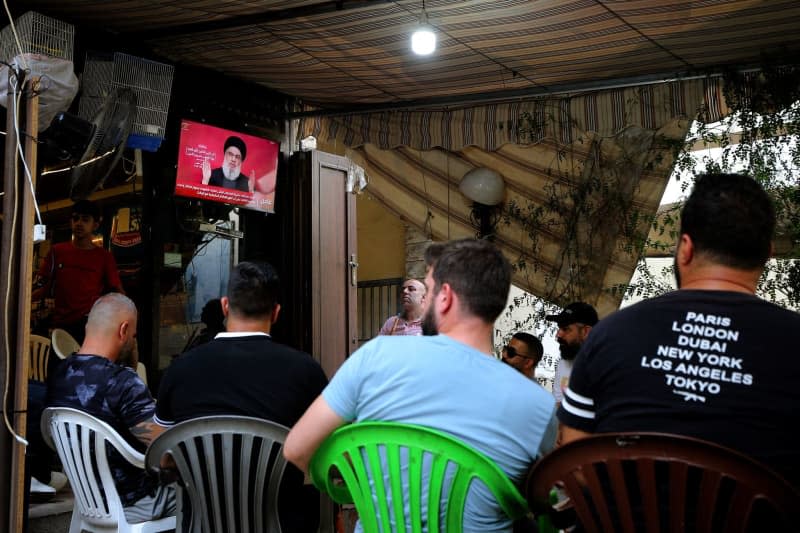The Israeli Air Force launched renewed attacks on Lebanon on Thursday, as tensions run high following the waves of coordinated blasts involving Lebanese electronic devices widely attributed to Israel.
At least 37 people have died after hundreds of pagers used by Lebanon’s Iran-backed Hezbollah militia simultaneously exploded on Tuesday and a second wave of communication devices – this time walkie-talkies – blew up on Wednesday.
About 3,000 people were injured in the blasts across the country, Lebanese Health Minister Firas Abiad told a press conference in the capital Beirut.
Israel’s army and intelligence services have not publicly claimed responsibility for the coordinated detonations. Hezbollah and Iran have accused them of orchestrating the attacks. Since the 1979 Islamic Revolution, the US and Israel have been regarded as Tehran’s primary adversaries.
The Israeli military said on Thursday evening it had fired at some 100 rocket launchers operated by Hezbollah “that were ready to be used in the immediate future to fire towards Israeli territory.”
In addition, the Air Force attacked “terrorist infrastructure” and a weapons cache in southern Lebanon, while artillery fired on the Naqoura area, the Israel Defense Forces said.
There is concern in Lebanon, which borders Israel to the south, that the Israeli army could be preparing a ground offensive into the country.
Israeli Defence Minister Yoav Gallant has said military action targeting Hezbollah “will continue.”
“Hezbollah feels persecuted,” Gallant was quoted as saying by his office after a briefing on operational developments in northern Israel.
But he added: “The sequence of our military actions will continue.”
“In the new phase of the war there are significant opportunities but also significant risks,” Gallant said.
The consultations with high-ranking military and secret service commanders had revolved around different scenarios in the fight against Hezbollah, according to the minister, with the aim of enabling those evacuated from northern Israel to return home.
The army called on civilians to stay away from military training areas in the north of the country at the weekend.
The military will carry out “activities” there, so unauthorized persons face a potentially life-threatening situation in those areas, it said.
It was possible that shots and explosions would be heard in nearby villages, the message continued.
The exact meaning of the instructions was initially unclear.
The region has faced a constant risk of escalation since the outbreak of the war in the Gaza Strip between Israel and the Palestinian militant group Hamas in October. Both Hamas and Hezbollah are groups hostile to Israel and are backed by Iran.
Hezbollah leader vows retaliation
Hezbollah leader Hassan Nasrallah called the back-to-back communication device blasts “a declaration of war.”
“There is no doubt that we have been subjected to a major security and humanitarian blow, unprecedented in the history of our resistance and perhaps in the history of the conflict with the enemy,” he said.
He vowed, “in the name of the martyrs and the wounded, that the Lebanon front will not stop until the aggression against Gaza stops, regardless of the sacrifices.”
Nasrallah said the blasts were “a major terrorist operation, an act of genocide, and a massacre,” and vowed punishment and retribution for an act of “unprecedented aggression.”
He also commented on Israel’s aim of returning people to the north, who have fled the area due to ongoing clashes.
“What you will do will increase the displacement of the displaced from the north and will eliminate the opportunity for their return,” the leader of the Iranian-backed militia said.
As Nasrallah was speaking, Israeli warplanes broke through the sound barrier over Beirut, creating sounds similar to a bomb blast and generating panic.
Iran flies ambassador, patients out of Lebanon
Earlier, Iran evacuated its ambassador and 95 patients who were injured in pager explosions from Lebanon, officials said. Most of the wounded suffered eye and hand injuries.
Iranian Foreign Minister Abbas Araghchi visited the injured diplomat, Mojtaba Amani, at a hospital in Tehran on Thursday.
Hezbollah is Iran’s most important non-state ally.
Two Israeli soldiers killed in Lebanese attack
Two Israeli soldiers, a 20-year-old soldier and a 43-year-old reservist, died in the north of the country due to Lebanese shelling, the army said.
The Times of Israel reported that the reservist was killed in the western Galilee region by an explosive-laden drone launched by Hezbollah.
The younger soldier was reportedly killed in an attack by Hezbollah with two anti-tank missiles on Israel’s northern border. Eight other soldiers were wounded, one of them seriously, according to the report.
This brings the official tally of those killed in Israel in the border area with Lebanon since October 8 to 48, including civilians and soldiers.
Some 600 people have been killed in Lebanon during that period, most of them Hezbollah fighters.
Clashes continued as four people suffered minor injuries due to an Israeli airstrike near the port city of Tyre in southern Lebanon.

EMEA Tribune is not involved in this news article, it is taken from our partners and or from the News Agencies. Copyright and Credit go to the News Agencies, email news@emeatribune.com Follow our WhatsApp verified Channel





